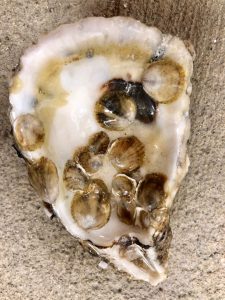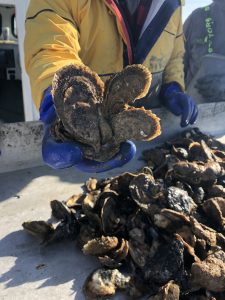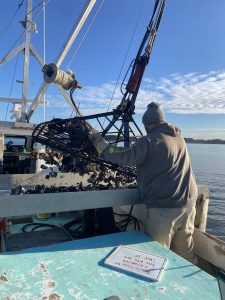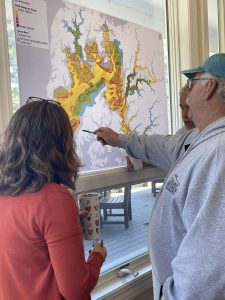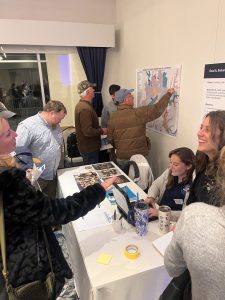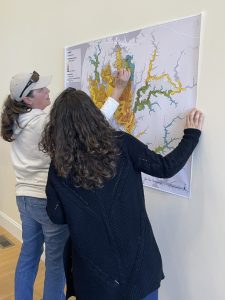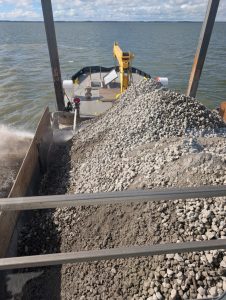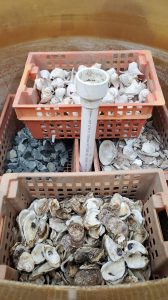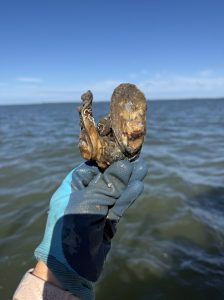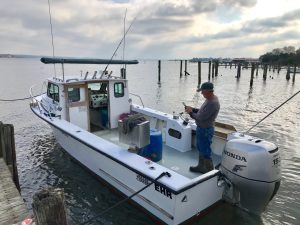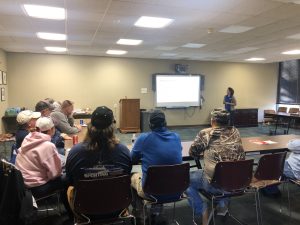The Oyster Recovery Partnership (ORP) is proud to take a leading role at the 2025 Coastal and Estuarine Research Federation (CERF) 28th Biennial Conference, where our team will share research, tools, and on-the-ground experiences to shape the future of coastal restoration and management. This year’s conference theme, Estuaries: Tradition and Transition, draws on the deep heritage of estuarine science and culture in the Chesapeake Bay while also acknowledging that coastal science is critical to address global challenges.
This year, ORP is hosting three sessions and presenting in multiple talks highlighting innovation, collaboration, and the co-production of knowledge across the restoration and aquaculture sectors for meaningful coastal management. Staff will also volunteer to support other conference programs, including the CERF mentorship program, serving as judges for the student presentation awards, and participating in networking events.
ORP-Led Sessions
Tuesday, November 11 | 8:00–11:30 AM
Scientific Session: Co-production of Knowledge and Recommendations for Coastal Restoration and Management
This session focuses on real-world examples of co-produced knowledge and/or recommendations for coastal restoration and management that have been successfully implemented to address coastal challenges. Topics include approaches to effectively engage end-users and reach consensus among diverse perspectives, integrate TEK/LEK into recommendations, and incorporate co-produced knowledge into management decisions and actions. Presenters and attendees are encouraged to participate in the adjoining collab session, which will facilitate discussion and exploration of topics and strategies introduced in this session. This session should be of interest to restoration practitioners, scientists, managers, and others seeking to achieve equitable and effective coastal resource management.
Tuesday, November 11 | 1:00–2:30 PM
Collab Session: Co-production of Knowledge and Recommendations for Coastal Restoration and Management
This session will build on topics presented during the adjoining scientific session related to the co-production of knowledge and recommendations for coastal restoration and management. Exploration of key strategies to effectively engage end-users, a reflection on lessons learned, and a discussion of key outcomes will be facilitated through small and large group discussions and interactive activities to encourage idea exchange. Attendees will leave with actionable tools and strategies to apply in their own work, including a network of others conducting similar efforts.
Wednesday, November 12 | 1:00–2:00 PM
Scientific Session: Tradition Meets Innovation: Transforming Shellfish Aquaculture and Harvesting
Shellfish aquaculture and harvesting are rapidly evolving, integrating traditional and local ecological knowledge (TEK/LEK) from the industry, including commercial fishers, aquaculture farmers, and other interested parties, with modern technologies to promote sustainable practices. Collaborative efforts have fostered partnerships among scientists, aquaculture professionals, and policymakers to develop industry standards and adaptive management strategies. This session will explore how TEK/LEK complements academic research and innovation in addressing critical estuarine and coastal management challenges. Topics include:
- Advances in shellfish cultivation, such as hatchery-produced spat-on-shell for oysters, clam seed planting, and mussel farming innovations, showing how traditional fishing practices and modern technologies enhance production and resource management.
- Building on TEK/LEK using modern tools like hydraulic dredges, remote monitoring systems, and GPS-based mapping to improve efficiency and support sustainable aquaculture and fisheries management.
- Co-developing electronic systems with industry to improve seafood traceability and farm management, ensuring these systems are practical, effective, and widely adopted.
- Supporting commercial fishers in integrating aquaculture practices with traditional harvesting methods to promote industry growth, resource sustainability, and the application of TEK/LEK in advancing aquaculture as a sustainable alternative to wild harvest.
- Incorporating industry knowledge to guide decisions on aquaculture siting and fisheries replenishment activities, supporting resource management and restoration goals.
- Collaborating with local communities, environmental NGOs, and industry to align aquaculture initiatives with broader goals, such as shoreline protection and nutrient reduction, creating solutions that benefit both the environment and the industry.
ORP Presentations
In addition to hosting sessions, several ORP team members will deliver individual presentations on multiple topics that showcase the organization’s growing leadership in oyster restoration, data-driven decision-making, and partnerships with coastal communities.
- Jennica Moffat, Monitoring CoordinatorSession: Are We There Yet? Timelines for Coastal Ecosystem Restoration
Monday, Nov. 10 | 8:15–8:30 AM
Beyond the Metrics: Exploring a Decade of Monitoring Data from Maryland’s Large-Scale Oyster Restoration Effort.
- Dr. Olivia Caretti, Coastal Restoration Program Manager
Session: Co-production of Knowledge and Recommendations for Coastal Restoration and Management
Tuesday, Nov. 11 | 10:45–11:00 AM
Improving Oyster Management in Eastern Bay, Maryland by Leveraging Local Ecological Knowledge through Co-Production.
- Jen Walters, Oyster Industry Program Manager
Session: Evaluation of Artificial Oyster Reef Substrates for Habitat Restoration
Wednesday, Nov. 12 | 8:30–8:45 AM
Partnering to Find the Next Best Substrate for Oyster Restoration Across Sectors in Maryland.
- Ward Slacum, Executive Director
Session: Tradition Meets Innovation: Transforming Shellfish Aquaculture and Harvesting
Wednesday, Nov. 12 | 1:00–1:15 PM
Co-developing Digital Tools for Sustainable Shellfish Harvest and Aquaculture.
Collectively, these presentations showcase ORP’s continued investment in advancing restoration science—from evaluating long-term monitoring data to developing tools that strengthen aquaculture and industry partnerships.
To learn more about the full CERF 2025 conference program, visit the official program schedule.

